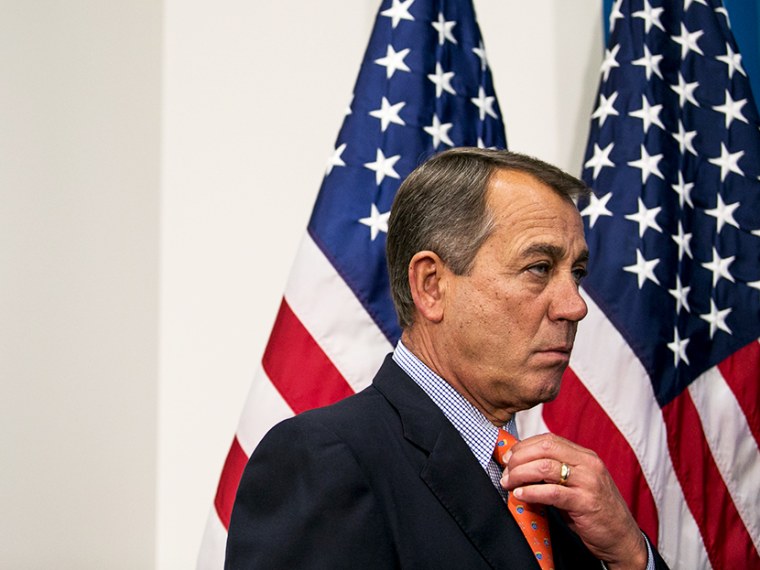Uh oh. The U.S. is approaching the next debt ceiling in mid-October. Congress will have to raise the borrowing limit to avoid default, and Republican leaders are insisting yet again on spending cuts in exchange for their vote.
"I’ve made it clear that we’re not going to increase the debt limit without cuts and reforms that are greater than the increase in the debt limit," House Speaker John Boehner said Monday at a fundraiser, according to the Idaho Statesman. "We're going to have a whale of a fight," he promised.
It's the same GOP demand that created 2011's debt ceiling crisis--the one that led to the deal creating sequestration's automatic spending cuts. That precedent is now fueling fears that Congress and the White House will have another dangerous stand-off, imperiling America's still-sluggish recovery and the stability of global markets.
And if that weren't enough to worry about, we'll reach the debt ceiling this year earlier than expected: just after the Sept. 30 deadline for the next budget, which could mean risking a government shutdown as well as default if Congress can't come to a fiscal agreement.
But this debt-ceiling fight is different.
Boehner may be full of fighting words this week while his members are still hosting town halls back home. But he's already whiffed on the debt ceiling once before: in January, House Republicans voted to "suspend" the debt ceiling for a few months without any new cuts attached to the vote. Technically, it wasn't a debt-ceiling hike: It temporarily suspended the part of the law that imposes a borrowing limit. Functionally, however, there was no difference between the suspension and an increase. As such, Boehner has already shown himself willing to let pragmatism overrule the right flank of his party.
What's more, even Republicans who've vowed to use the debt ceiling as a bargaining chip can't agree on what they want in exchange. At Monday's fundraiser, Boehner stressed that "it’s time to deal with the mandatory side" of spending, indicating that entitlement cuts would be at the heart of the GOP's demands. But a contingent of high-profile conservatives has made defunding Obamacare the highest priority, threatening to both shut down the government and tie the debt ceiling to the issue. Divided, Republicans may find it harder to hold firm during this fall's fiscal fight.
Democrats, for their part, have learned the lesson of 2011, when they agreed to negotiate with Republicans over the debt ceiling. The White House was betting that the deal would result in a "grand bargain" of fairly reasonable entitlement reforms and tax hikes. Instead, they got more than two years of stalemate and indiscriminate, across-the-board spending cuts.
The White House didn't make that mistake again: in January, Democrats refused to negotiate over the debt-ceiling—and Republicans relented. This morning, Treasury Secretary Jack Lew said the strategy hasn't changed. President Obama is "not going to be negotiating over the debt limit," he said on CNBC. "Congress has already authorized funding, committed us to make expenditures. We're now in a place where the only question is, will we pay the bills that the United States has incurred?"
That's not to say there won't be the "whale of a fight" that Boehner has promised. There is still no obvious compromise for getting rid of sequestration, as the House and Senate are still $91 billion apart on the budget. And the timing means the budget fight could get lumped into the debt-ceiling vote. But Republicans have already shown their hand on that issue, too: shortly before August recess, House Republicans couldn't even pass the cuts to transportation and housing they had previously agreed to.
So right now, it's hard to hear Boehner's threats of a debt ceiling standoff as anything but bluster.
